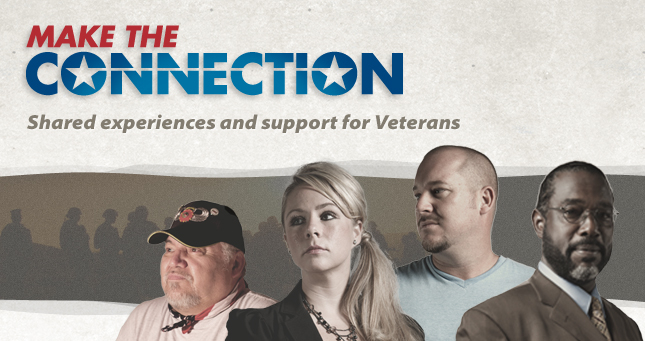
Since our launch two years ago this week, more than 350 Veterans and their family members stepped up to share their stories on camera for the Make the Connection campaign – that’s more than 21 hours of video. And, over the course of 24 months, more than 2.5 million people have visited the website MakeTheConnection.net.
In just over 730 days, more than 1.8 million people have become fans of our Facebook page, and the Veteran stories have been viewed more than 6.9 million times. It’s been just over 17,000 hours since Make the Connection launched, but no matter how we spin those numbers, it’s difficult to compare them to the number of people who are making the connection each hour, day and month, and spreading and celebrating Veteran strength and resilience.
That first Veteran’s story, and the stories of more than 350 other Veterans and their loved ones who have opened a window into their lives for us since that day, are helping to change the way our culture thinks about mental health. Because of open and honest men and women like that young Veteran, Americans from coast to coast have visited MakeTheConnection.net and found inspiration in the true stories of former and current service members who have confronted, connected and overcome all types of mental health and life challenges.
Visitors to MakeTheConnection.net listen to Veterans and military family members of all branches and ages who have found treatment and support for conditions PTSD, problems related to military sexual trauma and depression. They learn about tools for managing symptoms like flashbacks and feeling on edge. They find resources for dealing with life events like transitioning from service, retirement, and financial and legal issues.
And on the campaign’s Facebook page, people write comments that offer thanks and support to Service members, Veterans and military families. They repost and share Veterans’ stories of strength and resilience across their networks of hundreds of thousands of Americans. They speak out about the importance of mental health treatment and create a welcoming atmosphere for those who can benefit from assistance.
And the conversation is still growing: More than 20 million people were reached from the Make the Connection Facebook page last month alone.
Think about what those 3 million website visitors and 1.8 million Facebook fans mean in a country with a population just shy of 315 million. It means that when you hear a 747 fly overhead, there’s probably someone in that plane who has been touched by one of our Veterans’ inspiring stories. Or when you take your seat in a football stadium, there are probably more than 100 cheering fans who may look at Veterans’ mental health issues in a more informed and educated way.
Make the Connection needs people like you to continue to reach our nation’s Veterans and their loved ones. Visit MakeTheConnection.net and watch inspiring videos. “Like” www.facebook.com/VeteransMTC and share its content with your networks. And, encourage the Veterans you know to reach out for the resources and support they deserve—and have earned.
Each one of these small will help change the national dialogue on mental health issues – for our Veterans and for all Americans.
Topics in this story
More Stories
The Social Security Administration is hoping to make applying for Supplemental Security Income (SSI) a whole lot easier, announcing it will start offering online, streamlined applications for some applicants.
Yusuf Henriques, an Army Veteran and former combat medic, is the founder and CEO of IndyGeneUS AI, a genomics company on a mission to improve health equity by increasing representation of women and racial minorities in clinical trials.
Online shopping scams are the riskiest scam for Veterans, with 77.3% of reports confirmed losing money when targeted by this scam.








